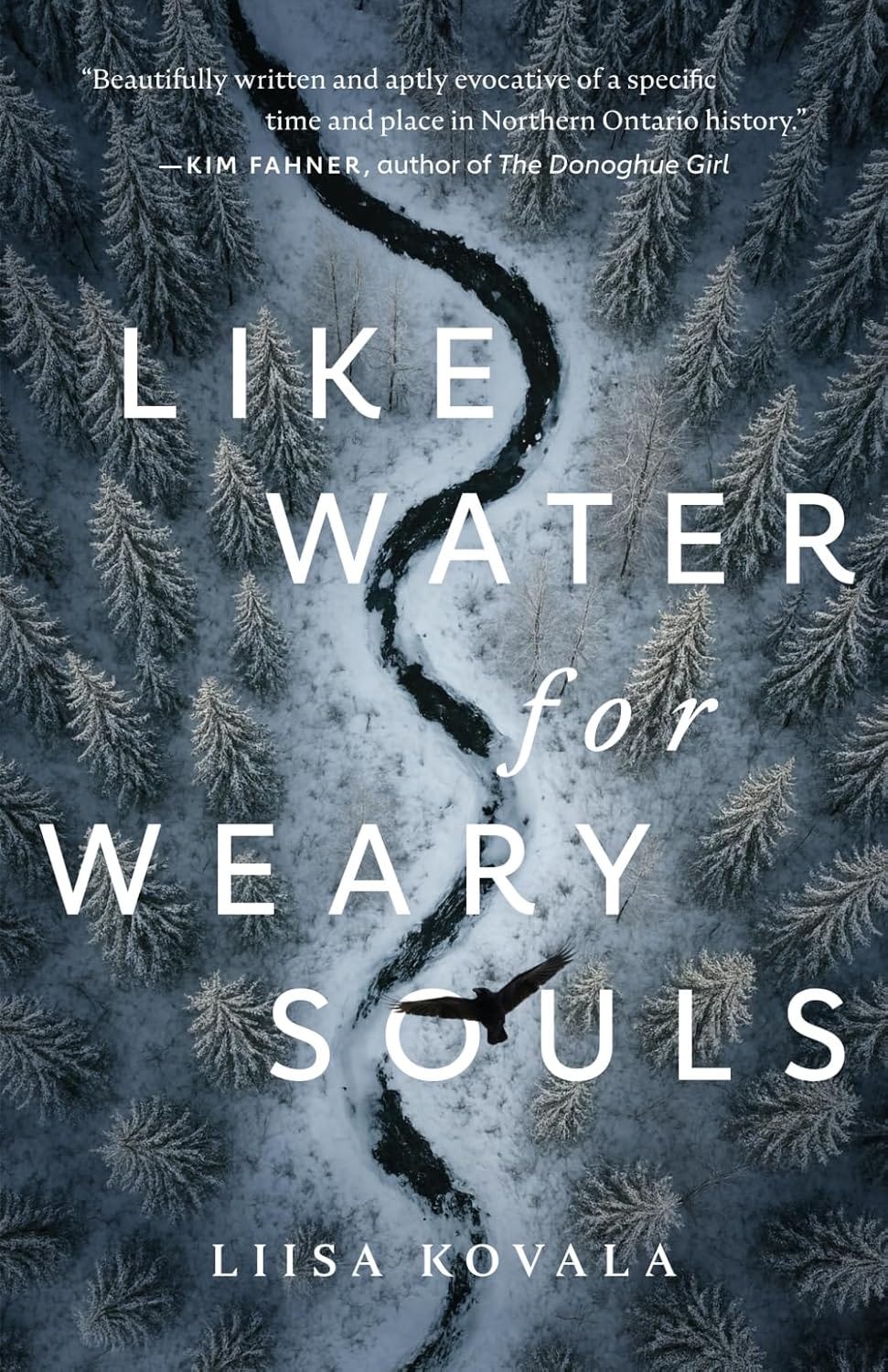Like Water for Weary Souls by Liisa Kovala
Reviewed by Melanie Marttila
Like Water for Weary Souls by Liisa Kovala is an historical mystery. The author conducted research into the history of Sudbury, where the novel is set, along with Finns in the Sudbury area, Finnish immigrant women in Canada, and “Karelian Fever,” a phenomenon affecting the Finnish community and resulting from the poverty caused by the Great Depression. Kovala also delves into classist politics and cultural othering as well as prostitution and women’s reproductive health at the time. Her novel was inspired by a real event.
“Like Water for Weary Souls is both a compulsive mystery and an immersive experience of Sudbury’s history.”
Kovala doesn’t put her research on display in tedious infodumps, however. All information emerges seamlessly from the characters and their circumstances. Her worldbuilding brings Sudbury of the early 1930s to vivid life on the page.
The title is a paraphrase of Proverbs 25:25: “As cold water to a weary soul, so is good news from a far country.” It ties into the themes running throughout the novel. The protagonist’s mother even states the title during one of their visits later in the novel.
The mystery is framed by a prologue and epilogue written from the perspective of Hanna Kivi’s ghost, which offer context and closure to the story.
Hanna Kivi and her sister Esteri (Essi) move from their family farm in Wanup into the city. Both find work as domestics but can only afford to take rooms at Rouva Russa’s boarding house in the Donovan neighbourhood, which is also a brothel.
When Hanna is found frozen in Nolin Creek, Essi immediately suspects foul play. Hanna would never risk crossing the creek, not after their sister Martta drowned years earlier. The police want to rule Hanna’s death an accident, though.
Essi’s investigation takes her deep into the city’s underbelly. Didn’t know a mining town like Sudbury could have an underbelly? It does, both now and then. Brothels like the one Rouva Russa (AKA Madame Rose) owns were not uncommon, and were often the only resort for women who could not find employment as domestics.
Essi, initially embarrassed to rent a room from Rouva Russa, becomes friends with some of the women who work there. They are critical to her investigation into Hanna’s death and later, when the brothel is raided by the police, Essi becomes their staunch defender, and they become hers.
I love Kovala’s depiction of women’s solidarity. With the exception of one catty domestic, Millie, who used to work with Hanna, the women in this novel come together and support one another, rising to every challenge. And Essi needs all the help she can get, because Constable O’Rourke dismisses her concerns, and his partner, Robert Cane, while he seems sympathetic, must follow his partner and superior officer’s lead.
When Essi is about to find the answers she seeks, Kovala switches to Hanna’s point of view a year earlier in a technique reminiscent of Gillian Flynn’s Gone Girl, though the reveals of Hanna’s story are nothing like Amy Dunne’s. Readers gain many of the answers to Essi’s questions, and when the point of view switches back to Essi, the tension is high, because Essi does not know what readers do, and she is about to run afoul of the person we now know is the murderer.
Who killed Hanna Kivi?
Was it Pekka Peltonen, the burly drunk and rumoured murderer Hanna was seen talking to? Was it Matti Korhonen, the Karelian recruiter Hanna was secretly working for? Could it be Millie, Hanna’s former coworker, who implies that Hanna was flirting with their boss? The more Essi learns, the more she worries she didn’t know her sister at all.
Like Water for Weary Souls is both a compulsive mystery and an immersive experience of Sudbury’s history. It will have broad appeal to readers of historical fiction, mysteries, and women’s fiction.
About the Author
Liisa Kovala is a Finnish-Canadian author and book coach. Like Water for Weary Souls is her second historical novel. Sisu’s Winter War was her debut (Latitude 46, 2022). Surviving Stutthof (Latitude 46, 2017), recounts her father’s experiences as a Finnish merchant marine imprisoned in a Nazi concentration camp in Poland. It was short-listed for a Northern Lit Award in 2018 and was translated into Finnish. Liisa is a member of The Writers’ Union of Canada and the Canadian Authors Association. Liisa also writes the Hygge House Cozy Mystery series as A. L. Jensen (debuting in early 2026). Her work explores her Finnish heritage and celebrates the northern landscape she calls home.
About the Reviewer
Melanie Marttila (she/her) is an #ActuallyAutistic SFF author-in-progress, writing poetry and tales of hope in the face of adversity. Her poetry has appeared in The /tƐmz/ Review, Polar Starlight, Sulphur, and her debut poetry collection, The Art of Floating, was published in 2024 by Latitude 46. Her short fiction has appeared in Through the Portal, Pulp Literature, and On Spec. She is a settler writing in Sudbury, or ‘N’Swakamok, on Robinson-Huron Treaty territory, home of the Atikameksheng Anishnawbek and the Wahnapitae First Nation, in the house where three generations of her family have lived, on the street that bears her surname, with her spouse and their dog.
Book Details
Publisher : House of Karhu
Publication date : Oct. 7 2025
Language : English
Print length : 281 pages
ISBN-10 : 0995083436
ISBN-13 : 978-0995083431






Thank you for the great review, Melanie! And thank you to the Seaboard Review of Books. I appreciate you sharing the word about my latest novel.
Clearly I will be finding and reading this book. Thank you.